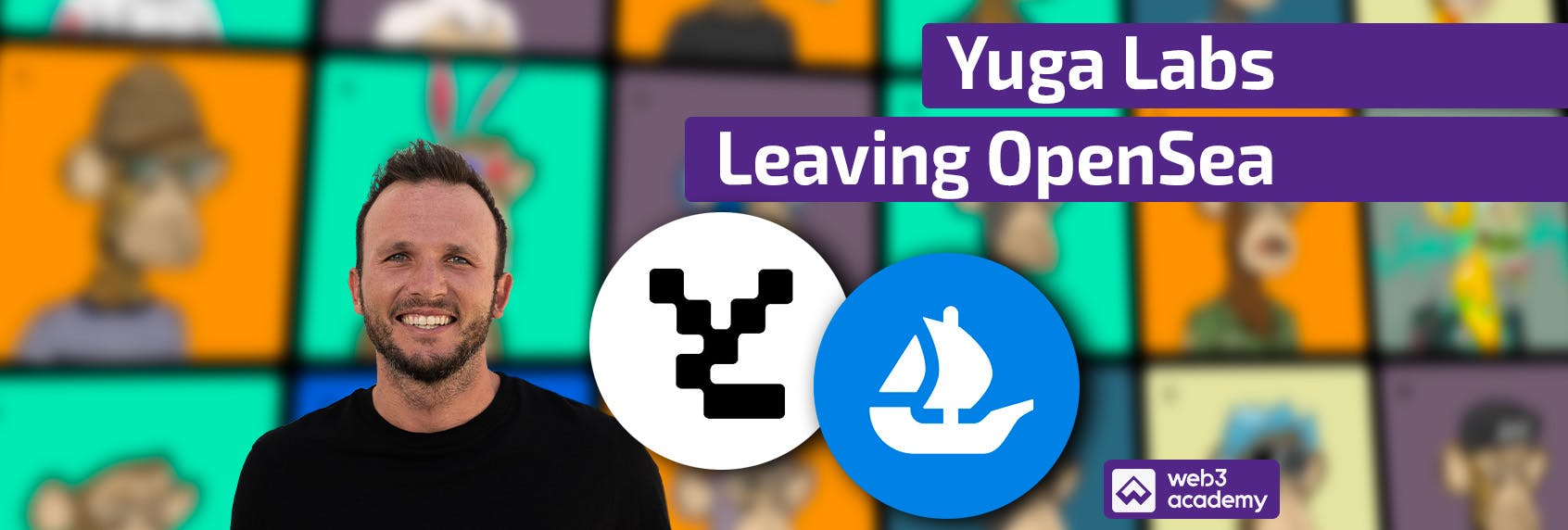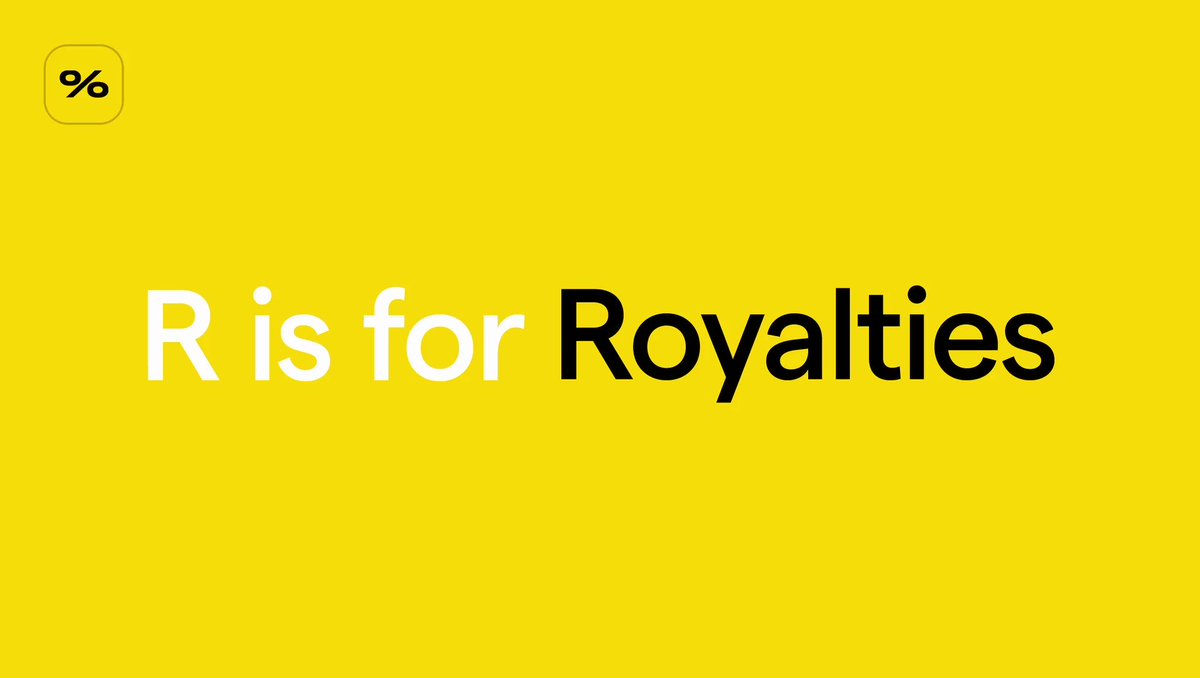
Yuga Labs Leaves OpenSea Amid Royalties Cut
PLUS: OpenSea Removes Binance Smart Chain
GM DOers! 😎
Inevitably, we must talk about NFT royalties… Again. 🤷
Just to get you up to speed, NFT royalties are a set percentage of resale revenue automatically given to the original creator every time the NFT is resold. ♻️
Over the past year, the concept of royalties has been leveraged by new NFT marketplaces (Blur & LooksRare), who set royalties close to 0% to attract new users.
And it worked… As you can see below, OpenSea (light green) has been losing more and more market share. 📉

Typically, royalties used to vary from 5% to 10% and it was a great additional revenue for NFT creators. But that was the case when NFTs came around. Now, that’s all gone. 🌬️
As of August 31st, OpenSea is making royalties optional for new collections, meaning anyone can give as much as they want to the creator when selling their NFT. 🤏
As for existing collections, the current rules will stay intact until the end of February next year.
This new ‘opt-in’ mechanism makes royalties work like tipping at restaurants, and we can assume that most people will choose not to pay X % more just to reward creators. 💸
So we’ll assume that royalties are now inexistent (or close to 0). This is something that creators dislike (naturally).
Hence Yuga’s response: They want to leave OpenSea.
Let’s delve into what this all means… 👇

Paragraph powers modern newsletters, enabling readers to own their content and creators to share revenue with fans.
Web3 Academy has already transitioned to Paragraph because it’s the future of newsletters.
If you're a creator, writer, or keen reader, explore Paragraph's early opportunities!
Yuga Labs is Leaving OpenSea 👋
There are a few things that we need to address here.
First of all, Yuga Labs is leaving OpenSea because they now can’t benefit from royalties anymore…
But that’s not news. It's already the case on Blur, where royalties are almost 0%.
Blur enforces a 0.5% royalty fee. However, anyone with a Blend account can trade NFTs at 0% royalties (this is an incentive for people to set up a Blend account).
So in reality, Yuga’s Bored Apes get almost 0% royalties on Blur, and so do most other collections.
And the only place any NFT collection benefits from royalties is (or used to be) OpenSea, who covers 99.2% of all NFT royalties.

By threatening to leave, Yuga Labs is simply trying to stop this move from happening to keep benefitting from additional revenues.
But for OpenSea (who’s losing market share fast), keeping royalties makes 0 sense if they wish to compete (more on this in a second).
So what if Yuga leaves? Is that going to kill OpenSea?
Many think so, as they state that Yuga’s activity represents 80% of all OpenSea volume.
But those numbers aren’t accurate, as not all of Yuga’s activity occurs on OpenSea. So in reality, the numbers are around 15%. (According to @punk9059)

But if OpenSea is going to lose a big portion of their business by removing the enforcement of royalties, why would they even do it in the first place? 🤔
Why is OpenSea Removing Royalties? 🤷
To begin with, let’s make it clear that OpenSea isn’t removing royalties. They’re simply not enforcing them anymore.
Instead of users being forced to pay X % to buy/sell digital items, they can now choose to pay up if they want to help the creators.
But why are they doing this?
Because OpenSea is a dying business, as you can clearly observe from their horrible drop in revenues.

This drop occurred due to the amount of fees they generated on their platform, which is down bad since the NFTs entered in a bear market.

The bear market is a big component to OpenSea’s hit in revenues since there are less people active in the space. However, that’s not all.
If we’re looking at where royalties are paid, we can see that most other marketplaces have cut royalties. Only OpenSea hasn’t.

And if we look at the market share this year, we can see how OpenSea lost more and more to LooksRare (blue) and Blur (purple), because traders choose to go where they're not forced to pay royalties.

To conclude, we can clearly see that OpenSea is a dying business due to 2 main factors:
There are less people trading NFTs
Many traders opt for other marketplaces to avoid paying royalties
They can’t control (1.), but they can control (2.), which is why they’re choosing to make royalties optional, in the hopes that traders will come back to OpenSea.
Time will tell whether they will or not, but in the meantime, let’s talk about what else OpenSea has done and what our take is on all of this… ⏬
The Great Marketplace War: Who’s Winning and Why?
A while back, we wrote a PRO Report breaking down the NFT marketplace war between LooksRare, Blur and OpenSea.
While the stats have changed, the underlying reasons to why all of this is happening have stayed the same.
To get a better understanding of what’s going on & what’s to come, we recommend you read our PRO report here.
Just remember that this is paywalled for our PRO members. If you’re not a PRO yet, make sure you upgrade your membership:
OpenSea Removes Binance Smart Chain ⛓️
In other news, OpenSea will also remove support for Binance Smart Chain, in the hopes of cutting operational costs.
Instead, they’re focusing on integrating Ethereum Layer 2s, which are cheaper and more frequently used.
This isn’t a major blow for anyone, as trading NFTs on BSC isn’t super popular anyway.
But instead, it’s a big win for OpenSea who can both cut costs and integrate with chains that are actually being used.
Now… What do we make of all of this OpenSea saga?
Key Takeaways for DOers ⭐
As we’ve said for over 1 year now: NFTs as we know them are dead. 💀
The typical NFT playbook is:
Launch an NFT collection at X ETH and raise a bunch of capital
Make additional revenues from royalties
Promise people a metaverse
Sounds a lot like a pyramid scheme and people are finally waking up to that fact.
Royalties enable creators to profit when people exit, leading major players like PROOF, Yuga, and Azuki to thrive on increased NFT trading.
That’s the complete opposite of the true purpose of NFTs, which act like memberships to communities or cool experiences.
Once you put a token into the wallet of your community member (and do so cheaply), you never want them to sell.
Instead, you provide as much value as possible so they keep their membership, without wanting to flip it for a profit.
But that’s not the case today. The fact is that most of the NFT space is built on false promises (building a metaverse) and frankly, it’s all looking like a pyramid scheme right now.
This is unfortunate as we all know the true unlock of NFTs is far beyond just speculation.
It’s about providing true ownership
It’s about building and rewarding a community
It’s about unlocking new experiences for your holders through the interoperability of NFTs
Yet, most speculate and some get burned hard:
So what’s next?
Eliminating royalties forces projects to develop lasting revenue streams. Solely depending on royalties is not sustainable.
Now... Just because OpenSea has cut royalties doesn't mean everyone has. Blur still enforces 0.5% royalties & Rarible is trying to capitalize on an opportunity here.
But the trend of cutting (or at least minimizing) royalties is there. So what should everyone do?
Ideally, businesses should incentivize their holders to stick around by creating external revenue streams, generated by monetizing products/services that people want to use.
And giving holders special access, discounts or other perks.
This strategy does 2 things:
Creates a revenue stream for the business
Gives holders the confidence they need to keep believing in the business' vision
The closest we have to this is:
Pudgy Penguins’ toys – where Pudgy holders get a portion of revenue if their IP is used
VeeFriends IRL events (VeeCon) – where holders get free entrance
Web3 Academy, who's giving a 50% discount to all PRO Pass hodlers and 100% discount to all Founding members to our brand new Web3 Investing Masterclass. 😏
If you want to unlock your discount as a paying PRO member, head here & connect your wallet.
With the removal of royalty enforcement, many other projects will (hopefully) look for ways to monetize sustainably or to use NFTs solely as a tool to build/reward a community, and in the future, it will serve us well.
Remember, NFTs are tools, they’re not the business itself. The sooner people realize this, the sooner we can unlock the true potential of this tech.
The new meta is changing from ‘selling false hopes’ to ‘innovating to stay relevant’. And we’re bullish, even though markets are at their absolute worst. 😬
Thanks for reading. And remember, you're strong, you’re powerful, you’re alpha! ❤️
See you soon. ✌️
Disclaimer: This article is for informational purposes only and not financial advice. Conduct your own research and consult a financial advisor before making investment decisions or taking any action based on the content.



 127
127












